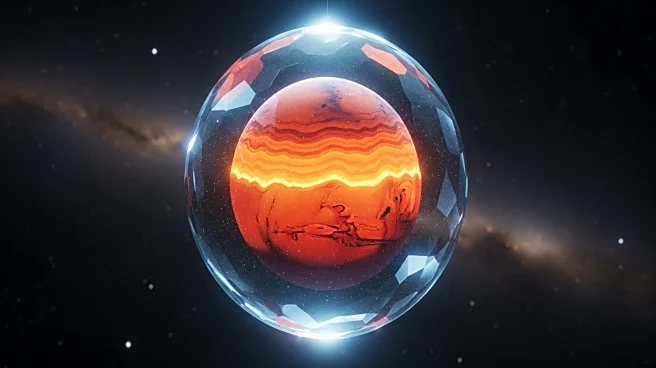What is the story about?
What's Happening?
NASA's InSight mission has provided new insights into Mars' geological history, revealing that the planet's mantle acts as a 'geological time capsule.' This discovery challenges traditional models of rocky planets, which are typically viewed as smoothly layered structures. The research, conducted by scientists from NASA and Imperial College London, utilized data from seismic activities known as 'marsquakes.' These marsquakes indicate a fractal pattern within Mars' interior, suggesting a preserved record of colossal impacts and magma oceans that crystallized over four and a half billion years ago. Unlike Earth, where tectonic activity continuously recycles materials, Mars has maintained a more pristine geological record.
Why It's Important?
The findings from NASA's InSight mission are significant as they offer a unique perspective on the geological history of Mars, providing clues to fundamental questions about the uniqueness of Earth and the possibility of life elsewhere. By understanding Mars' preserved geological record, scientists can better comprehend the processes that shaped rocky planets in our solar system. This research highlights the differences between Earth and Mars, emphasizing Earth's dynamic geological activity compared to Mars' static history. Such insights could influence future space exploration missions and the search for extraterrestrial life.
What's Next?
The study's results may lead to further exploration of Mars' geological features, potentially guiding future missions to investigate the planet's interior more closely. Researchers might use advanced technologies, including artificial intelligence, to analyze seismic data from Mars and other rocky planets. These efforts could deepen our understanding of planetary formation and evolution, contributing to broader space exploration goals. Additionally, the findings may prompt discussions among scientists and policymakers about the implications for Earth's geological uniqueness and the search for life beyond our planet.
Beyond the Headlines
The discovery of Mars' mantle as a geological time capsule raises ethical and philosophical questions about humanity's place in the universe. It challenges our understanding of planetary formation and the conditions necessary for life. The research underscores the importance of preserving Earth's geological record amidst ongoing environmental changes. Furthermore, it highlights the role of international collaboration in advancing space exploration, as scientists from various institutions work together to unravel the mysteries of the cosmos.















